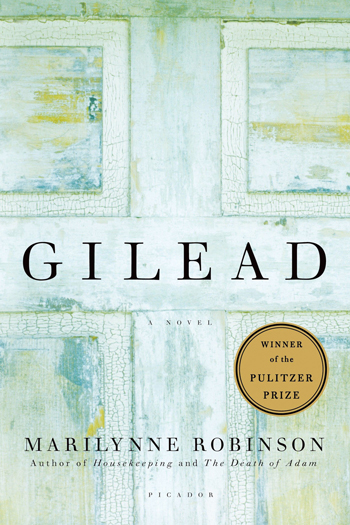 I don’t know what to say about this book. It is unlike anything I’ve read so there’s nothing that I can use for comparison. Just as it was in Housekeeping, Marilynne Robinson’s writing is seamless.
I don’t know what to say about this book. It is unlike anything I’ve read so there’s nothing that I can use for comparison. Just as it was in Housekeeping, Marilynne Robinson’s writing is seamless.
I initially thought I’d breeze through Gilead because it’s a short book. That’s not what happened because its content is quite dense and it’s not the sort of narrative that one can skim. So after the first few pages I decided to take my time with it. Over the course of a month I read a few pages about every day or every other day. Since it is one long letter, it was like reading a diary and I treated it as such.
Gilead is a final message from an elderly dying man to his young son. There are no chapter breaks or any real linear structure at all. It is a string of one thought to the next, a journal of reflection and homage. If I had to map out a plot, I wouldn’t know where to start.
The setting is Gilead, Iowa in 1956 and Reverend John Ames is about to die. He’s in his 70s and his storytelling begins a generation before his time, connecting the dots of theological longevity that grounded the Ames family. Both his grandfather and father were preachers and their convictions were lived out against the backdrop of the Civil War. There are many references to timely political and social turmoil with which each pastor wrestled.
We learn that in his younger years John was married once before and had another child, both wife and son long deceased. The sorrow he carried around regarding those loses was evident in his tone. However, he ended up meeting Lila, a younger woman who captured his heart and gave him new life. She proposed to him, they married, and had a son – to whom this letter is being written – the next year. I’m not sure the age difference between John and Lila was ever specified, but from context we’re talking at least a generation apart.
Now, if I left the review like this, it’s likely you’d never give this book a chance. Ramblings of a dying man? No real plot? Old man religion? No, that’s not what Gilead is about.
I have at least ten pages folded at the corners, probably more, because the prose was that beautiful or the message was that poignant or there was something that I wanted to return to, such as:
“How I wish you could’ve known me in my strength.”
and
“I’m trying to make the best of our situation. That is, I’m trying to tell you things I might never have thought to tell you if I had brought you up myself, father and son, in the usual companionable way. When things are taking their ordinary course, it is hard to remember what matters. There are so many things you would never think to tell anyone.”
and
“The idea of grace had been so much on my mind, grace as a sort of ecstatic fire that takes things down to essentials.”
and
“I can tell you this, that if I’d married some rosy dame and she had given me ten children and they had given me ten grandchildren, I’d leave them all, on Christmas Eve, on the coldest night of the world, and walk a thousand miles just for the sight of your face, your mother’s face.”
and
“This whole town does look like whatever hope becomes after it begins to weary a little, then weary a little more. But hope deferred is still hope.”
Passages begin with things like, “I watched you play outside in the yard today and it made me think about…” and John goes into a story from there. Sometimes he talks about God and his personal, compassionate theology, and sometimes he talks about his friend Reverend Boughton and his son, Jack, a character I presume will have a role in the third book, Lila. Sometimes he tells a story about his childhood or another person from his church or town.
Whatever the message, John is going to be denied seeing his young son grow up in the world. His whole heart was poured out on paper in his final days. If you had to write all the wisdom you’d acquired in life and hand it to your child, what in the world would you say?

1 Comment
Comments are closed.